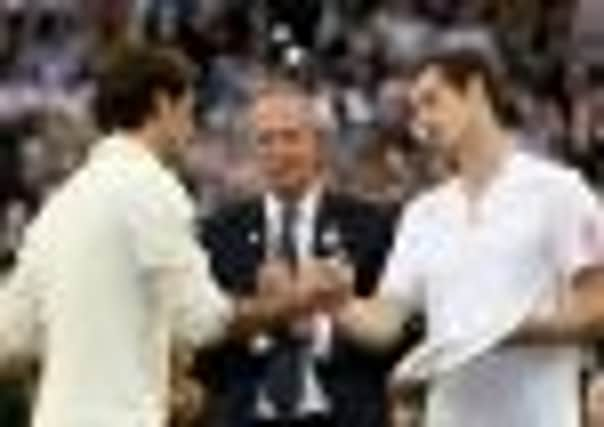It was always going to end in tears, admits Roger Federer


However, he had feared being reduced to an emotional mess on Centre Court, in the presence of his twin daughters, Charlene Riva and Myla Rose, less than 24 hours earlier.
Federer acknowledged the fact “there was so much on the line – not just for myself, but also for Andy,” adding “it was always going to finish in tears, either for the guy who won or the guy who lost. It was always going to be tough. I knew that ahead of time. I handle it well now. Is it my biggest victory? I don’t know, but looking back this is definitely a very special place in my heart.”
Advertisement
Hide AdAdvertisement
Hide AdOf course, no-one was expecting a Darren Clarke-esque performance when Federer fulfilled his champion’s duty at an early morning press-conference yesterday. There was little to suggest he had been glugging Guinness from the cup that had been newly returned to his possession, put it that way. The Champions’ dinner at Wimbledon is not known for its bacchanalian excesses but then Federer is not the type to over-indulge, even though this victory, his first grand slam win for more than two years, was among the sweetest of his 17 titles.
While Murray’s emotional outpouring grabbed the headlines, it was also a significant and moving moment for Federer, who, as a result of a record-equaling seventh Wimbledon crown, has now returned to No 1 in the world. When he wakes up next Monday morning, he will have set a new record for weeks spent at the top, one he currently shares with Pete Sampras.
However, it is his latest of seven successes at Wimbledon which means the most, since it takes him equal to Sampras on this count too. The American had already made contact with Federer to congratulate him by the time he sat down with sport writers yesterday. Making it extra special is the fact that this momentous victory took place in the presence of his daughters, born six months before he won his last grand slam title, in Australia in 2010.
What rates as something of a famine for someone of Federer’s ability underlines just how hard it is to win one of tennis’s major tournaments. Federer again sympathised with Murray, who has now lost four grand slam finals. The Scot apologised to Federer on Sunday evening, fearing that his tears might be viewed as attention-stealing. But the Swiss is himself well known for turning on the water works. He cried when he lost the 2008 final at Wimbledon and he wept with joy after winning his first French Open title in 2009.
“The thing that hit me in 2009 after I lost to Rafa [Nadal], I was actually just exhausted,” he reflected yesterday. “I was so close. And you think, man, I have to wait a year, are you serious? You are disappointed, because despite playing some of your best tennis, there can only be one winner. Sometimes you wish there can be two. And you think, okay I can handle this. But you walk out there and 15,000 people feel bad for you, suddenly it’s a bit awkward.
“I think you would be happier to stand there and hold the trophy, take pictures and sign autographs. That’s no problem. But to have to talk and speak, that’s the hard part. I know how it feels. But I believe it’s good to sometimes let it out.”
The Swiss also felt the bond strengthening between Murray and the British tennis public. He appealed to people to remember that tennis is an emotional sport, one that can be almost gladiatorial in its intensity. Strong though they might seem as they leap around court, when the actions stops, high-profile tennis players can often prove as vulnerable to a trembling lip as anyone else.
“I think he won over a lot of people and the hearts of the fans because of the emotions he showed in Australia, and now again here,” said Federer, with reference to the Scot’s tears after being beaten by the same opponent in Melbourne in 2010. “It does show as well that we are human. We may have the poker face on out there when we play as we try hard and smash serves and balls back and forward. Then, all of a sudden, when all is said and done, it’s different. You do care so dearly about winning and losing, and we care about what the crowd thinks. And, of course, our hearts can be broken. That’s why I feel for Andy in such a big way. He still has some years left. Other opportunities will come around if he has a good mental focus now.”
Advertisement
Hide AdAdvertisement
Hide AdFederer was conscious of the need to be “respectful” of Murray’s predicament as a home hope whose ambitions had been cruelly dashed. “I got the sense of how the crowd felt,” he said. “It was like three years ago when they were torn [after Andy Roddick’s defeat in the final, to Federer]. Of course they were happy for me but also very sad for Andy. It was a different Andy this time around but this was a very particular situation. I thought it was a great final. I thought Andy played amazing. I mentioned yesterday he is a true professional. He deserves the biggest of victories out there and I hope that he can make it.”